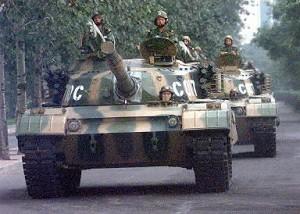The U.S. Department of Defense has finally released its 2005 report entitled “The Military Power of the People’s Republic of China”—after prolonged debate and what some experts call a “watering down” to obfuscate the Chinese threat.
The report comes in the wake of a chilling claim last month by Chinese general Zhu Chenghu that, if the U.S. were to attack China over Taiwan, China would not hesitate to use nuclear weapons and that “Americans will have to be prepared that hundreds...of cities will be destroyed by the Chinese.”
Although General Zhu claimed such views were his own, and not the official policy of the People’s Republic of China, Chinese officials are rarely allowed the autonomy to freely express their personal views.
The Defense Department report affirms that China has the capability of targeting nuclear weapons throughout most of the world, including the continental United States.
“Some of China’s military planners are surveying the strategic landscape beyond Taiwan,” states the report. However, the Chinese government’s official military policy on nuclear weapons remains one of “no first use.”
Nonetheless, the report suggests that the Chinese military may be considering using nuclear weapons in a different, unconventional way: It involves detonating a nuclear weapon in the upper atmosphere to create an electromagnetic pulse (EMP) that would send electromagnetic shockwaves down to the surface and disrupt military—as well as civilian—power and communication systems across a sizeable region.
The Chinese believe that “the United States and other nations would not interpret it as a use of force and as crossing the nuclear threshold,” says the report.
The report also suggests that the Chinese are developing anti-satellite (ASAT) systems to directly destroy or disable enemy satellites in the event of a conflict.
While the United States welcomes a “peaceful and prosperous” China, there are a number of factors that could preclude it besides the Taiwan issue. For one, there is increasing civil unrest in China, as evidenced by the (officially) 58,000 riots and protests against the government last year, as well as the 3.2 million Communist Party renunciations and high-level Party member defections in recent months.
Secondly, the Chinese leadership is finding it difficult to adequately handle the requirements for an open and transparent market economy since joining the WTO.
Thirdly, the government, plagued by instability and corruption, is still adapting to its emerging role as a world power. For these reasons and more, it is not inconceivable that in a domestic crisis China would try to direct its attention outward, like it did on the Japan issue earlier this year.
China has the largest standing army in the world with over 3 million troops—more than at the height of the Korean War. In addition, it claims it could summon another 10 million militia troops if necessary.
Still, many experts, like Center for Security Policy president Frank Gaffney, postulate that the Chinese threat is as yet underestimated. The “24 character strategy,” a military policy set forth by former president Deng Xiaoping in the early 1990s, includes the phrase “hide our capacities and bide our time.”




